Buying a property, whether it’s your first time, or you are well versed with the experience, can be a daunting and stressful time. This guide has been written to provide you with an easy-to-follow insight into the end-to-end process of buying a property. Of course this is just a guide and every property purchase is different, that’s why we’re always on hand to help guide you along the way.

In England and Wales, the process of buying a house starts with you making an offer, usually this is done via an estate agent. The sellers of the property will either accept your offer, or will try and negotiate a higher price with you. Once a price has been agreed you have purchased the property ‘sold subject to contract’.
What does sold subject to contract mean? Sold subject to contract means that you have agreed to buy the property at the price negotiated. A sold sign will usually be displayed and all parties can proceed to the next step. Being ‘sold subject to contract’ does not mean that either party are tied in to the transaction. You do not become ‘tied in’ until exchange of contracts has taken place.

Once you have agreed a price for the property you should instruct your solicitor as soon as possible so that work can commence straight away. Buying a selling property can be a lengthy process so the sooner work can commence then better.
You can obtain a detailed quote from us by calling one of our offices or using our online calculator. When you receive your quote, you can instruct us by either clicking the button in the email we send, or simply call us to tell us you wish to go ahead.
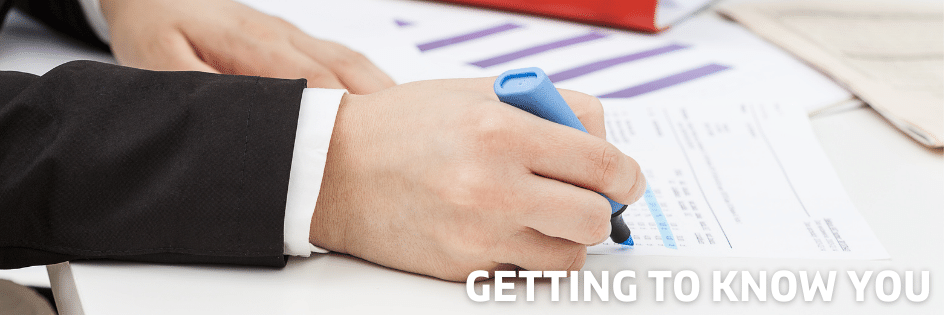
As solicitors, we have a duty to make sure that you are who you say you are in order to prevent fraudulent activity and money laundering, so we will ask you for some additional information to help us to do that. We also need to establish your identity which we usually do via an App, but if you do not have access to a smart phone, or are not able to use the technology, then we can agree other ways to identify you. Just give us a call and we will arrange that with you.
We will also need to check your ‘source of funds’. This basically means knowing and proving how you are intending on paying for the property. Often this is a combination of a mortgage and savings, or it might be that someone is gifting you the money for a deposit, or you are selling another property to part or fully fund the buying of a new one. Whichever way you intend on paying for the property, we need to see evidence of how you are doing that. This may mean asking you to show us banks statements showing the money in your account (usually going back at least 6 months) or seeing bank statements for the person who is gifting you the money. If the money is being gifted, we will also need them to sign a declaration that the money is a gift and not a loan.
The collection of this information is required by law, can be time consuming, and may seem intrusive. Please patient with us. As solicitors we are regulated by professional bodies and must comply with these regulations in order to protect us all from criminal activities.

If you need to get a mortgage to buy the property then you should contact either a Mortgage Broker or a Bank or Building Society straight away. Often waiting for a mortgage offer to be issued is the thing that holds up a transaction and so the sooner you start that process the better.
Your lender will want to know who your solicitor is. You will need to provide them with our details so that they can send us your mortgage offer once it has been processed. We are on the approved panels for most mortgage lenders but please call us if you are using a lesser known lender and need to check.
When you are using a mortgage to fund/part fund the purchase, we must act on behalf of the mortgage company as well as for you. This means that on occasions we must refer matters to the lender to approve before we can proceed. This can be something like access issues on the property, lack of building regulations consent for some work that has been done on the property, or seeking the lender’s approval for a gifted deposit.

In addition to the information we collect from you when we provide you with your initial quote, we need further information from you to get the process started. Sometimes the paperwork and detail being asked for can feel a little daunting, but buying a house is a legal transaction and as such it is very important that the information we collect is both accurate and detailed. Please feel free to call us if you need any help filling out the forms we send you. The forms can be completed on our App, via email, or we can print them out and post them to you.
What forms need completing when buying a property?
- Purchase Questionnaire. This tell us basic information about you and the purchase you have agreed to, and helps us to know what is important to you.
- Source of Funds Questionnaire. This helps us to understand how you are intending on funding the purchase.
- Stamp Duty Questionnaire. This helps us to be able to make sure you are paying the correct amount of tax (known as Stamp Duty, Stamp Duty Land Tax, and SDLT) on the purchase of the property so that you don’t get a nasty surprise from the Inland Revenue afterwards.
- Buying Together Form. This form collects details of any additional people who are buying the property with you.(see the section below on joint ownership of property).
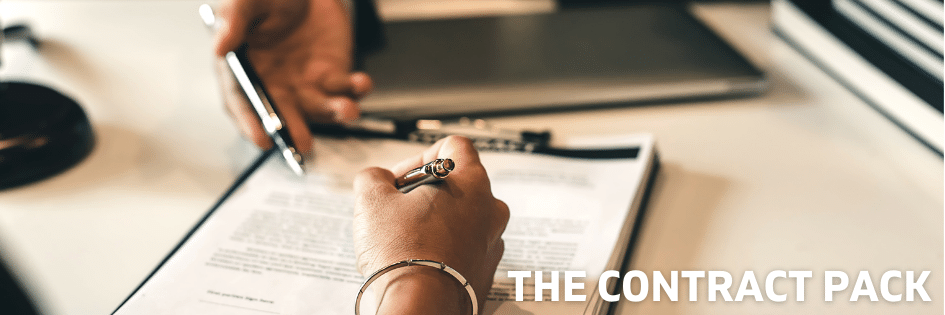
Your sellers will also be instructing their own solicitor to represent them. The seller’s solicitors will prepare and send to us a ‘contract pack’. This will include a contract for sale which sets out the agreed price and deals with matters such as the amount of deposit to be paid and any money being paid separately for fixtures and fittings. It also contains clauses about what happens if things go wrong once contracts have been exchanged.
This contract is sent to us along with any other information the sellers have about the property you are buying. They will also send us the details of the registered title to the property. We need this information before we can apply for your searches.
We will also receive some other documents from your seller’s solicitors which form part of the legal contract. These are:
- Fixtures & Fittings Form. This forms part of your contract with the sellers and tells everyone what is included in the sale and what is not. It includes items such as appliances, soft furnishings, and garden furniture like benches and greenhouses.
- Property Information Form. This also forms part of your contract with the sellers and tells us important information about the property which we need to know, for example if there have been any disputes over the property, or any work carried out at the property.

As soon as we have received the contract pack from the seller’s solicitors and £300 on account of costs from you, we will apply for your searches.
What are ‘searches’ when buying a property?
- A local search from the local authority where the property is based. This will show us various things including any planning permission or Building Regulations consents which have been granted over the property, the adoption status of roads in the area, and even the radon levels in the area.
- A water & drainage search. This tells us about the sewage and water system at the property.
- Coal mining search. This shows us whether the property is likely to be affected by past or present mining.
- Environmental search (optional). This will show us contaminated land risk, flood risk, ground stability, more detailed radon checks, energy infrastructure, transportation (eg HS2), protected areas.
Searches can take a few weeks to be returned (particularity the local search depending on which local authority looks after the property you are buying).
You will be asked to pay £300 on account of costs before we apply for any of the above searches. The £300 will be used to pay for the searches.

Once we have received the contract pack and the results of your searches we will study them in detail and will ‘raise enquiries’. This just means we will ask questions if anything is unclear or needs clarifying, or will ask for additional documentation in order to make sure your position (and that of your lender) is protected.
Part of our job is to make sure you know what you are buying, and that we make sure you are not at risk of taking on a liability for something you have not done. An example of this could be whereby the sellers have built an extension to the property, however the sellers have not fully complied with the terms of the planning permissions granted. In this example, were you to purchase the property, you would carry the risk of the local authority returning in the future to either request the works be changed in order to comply with the terms of the initial planning permission, or worse still, have the extension demolished.
Most problems can be resolved, they often just take some time to investigate. It is our job to ensure you are clear on the exact status of the property you are proposing to purchase and any risks involved. This is the purpose of the enquires. These enquiries can take some time and a bit of back and forth to get to the bottom of a situation, but they are extremely important.
Once all the enquiries have been responded to satisfactorily we should then be in a position to proceed to exchange of contracts.

There are a number of factors which can affect how quickly things happen when you are buying a property such as:
- Being in a chain
- Delays in your searches arriving
- Delays in your mortgage offer arriving
- Management companies who take a long time to return information to your sellers
- Your sellers getting information from any companies who may have a charge registered against the property, for example a Help to Buy Mortgage or a County Court Judgement
- Your sellers not responding to enquiries quickly or accurately
- Your sellers obtaining a Grant of Probate or Letters of Administration if they are selling for someone who has died
A stand alone purchase with no associated sale would normally take around 6 to 8 weeks but any of the above could result in delays meaning the process could take much longer. Here at Thornton Jones, we make sure that we proactively chase all parties for information, and take prompt action on any information we receive, so that we can keep any delays to a minimum.

When you are buying a property with someone else (usually, but not always a partner) you typically have three options and we need to know which option best suits you and your circumstances:
- Joint tenants. This is where you jointly own the whole of the property so that if one of you dies the whole property automatically passes to the other person (outside of any arrangements you may have stipulated in your Will). This is probably the most commonly used option where both parties are contributing a similar amount of money to the purchase of the property. it is also the default option if you don’t specify differently.
- Tenants in common in equal shares. This means you each own an equal share of the property. For example, if there are 2 purchasers, you would each own 50%. If one of you dies, the other still owns their 50% share and the other 50% would pass via the estate of the person who has died either by their Will or the intestacy rules if no Will has been made. This is common where, for example, one or both of you have children from a previous relationship and you both want to ensure that your half passes to those children and not to the other owner.
- Tenants in common in unequal shares. This is similar to the above but instead of the title being held in equal shares, it is held unequally. This is common where one party has put more money into the property than the other and wishes to protect that investment. In this case you should also make a declaration of trust which clearly sets out how the property is to be held. For example, it could state that person A gets the first £50,000 (to reflect the amount they have put in) and that anything above that is divided equally. Or it could be that you agree to split the property 70%/30%, for example, in favour of one person. Whatever you have agreed we can prepare the declaration of trust to reflect the situation.
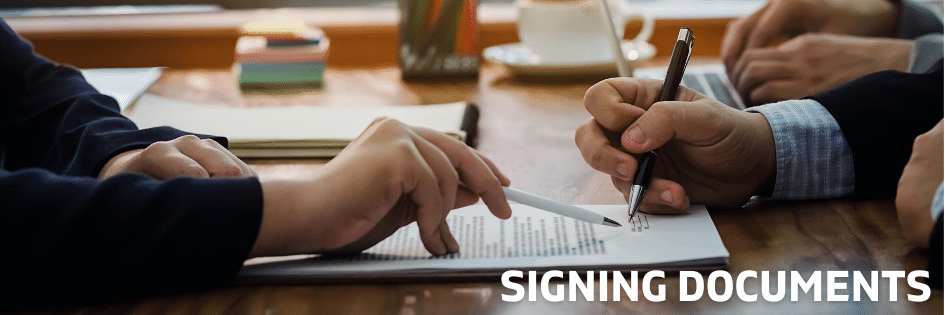
We will need to send you some documents to sign and will need these back with us before we can proceed to exchange contracts. These will usually be the Contract and Transfer (which is the document that passes the ownership from you to your buyers once your sale has completed) and a Mortgage Deed if you are getting a mortgage.
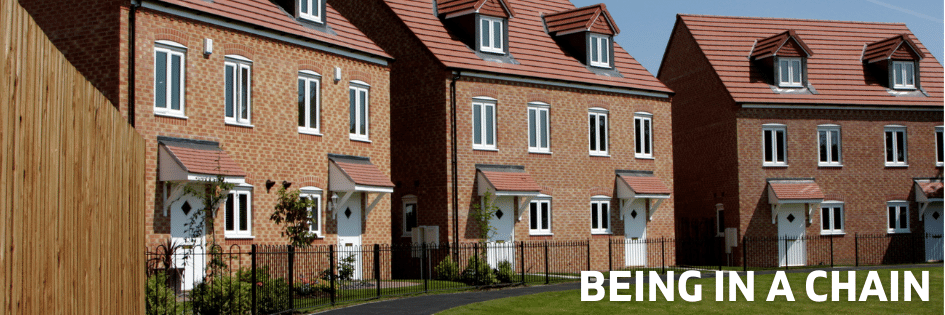
Sometimes, when you are buying or selling a property, you can be in what is known as a chain. This means that, for example, the person you are buying from needs to use the proceeds of the sale of this property to fund (or part fund) their next property.
Often chains can be long, with many people involved, and inevitably this can slow down the process. All parties in a chain must have completed of the the necessary tasks to allow the exchange of contracts and completion to occur.

Once we have the following in place, we can proceed to exchange of contracts:
- Your mortgage offer
- Satisfactory answers to all our enquiries
- Your signed documents
- Your deposit.
The deposit is often a percentage of the purchase price. This deposit can be funded from cash you hold in your bank or savings account, however on occasions, you may need the funds from the sale of your property to pay the deposit. In such situations the deposit is usually a fixed amount which is determined by the first transaction in the chain. That way, were there to be a breach of contract after exchange of contracts has occurred, all persons’ liability in the chain is the same amount.
At any point before exchange of contracts, either you or your sellers could pull out of the transaction. Once contracts have been exchanged, pulling out of the transaction cannot happen without financial penalty.
The exchange of contracts is, in essence, a legally binding promise for the sellers to sell their property and for you, the buyers, to buy the property. You will also be agreeing and committing to a completion date when you exchange contracts which cannot be changed, and allows you to all plan your move such as finalising your packing, agreeing dates with removals companies, and termination of any services such as Broadband and Sky TV.
Usually, there is at least a week between exchange of contracts and completion, but sometimes, especially when people are in chains, it can be a more complicated process and occasionally, exchange and completion happens the same day. This can add to the stress for all concerned and therefore we try and avoid this wherever possible.
Once Exchange of Contracts has occurred, and a completion date has been agreed, we will formally request your mortgage funds from your lender (if you are part-funding your purchase with a mortgage) and do our final searches.

Completion takes place when we (your solicitors) send your purchase balance (the purchase price less any deposit already paid) to your sellers’ solicitors and they confirm they have received it.
As soon as the money arrives, the sellers solicitors will inform us and also the estate agents that completion has taken place and that the keys can be released. At this point you are the new owner of the property you are buying.
If you are also selling a property in order to buy this one then there may be a few hours between the sale of your property completing and the purchase of your new property completing. In a chain, all transaction happen sequentially, so if it’s a large chain, then you may find your completions taking place later in the day. Being in a chain is a common occurrence and nothing to be concerned about. We will work proactively and swiftly to be sure you can move into your new home by close of business on the day of completion at the latest.
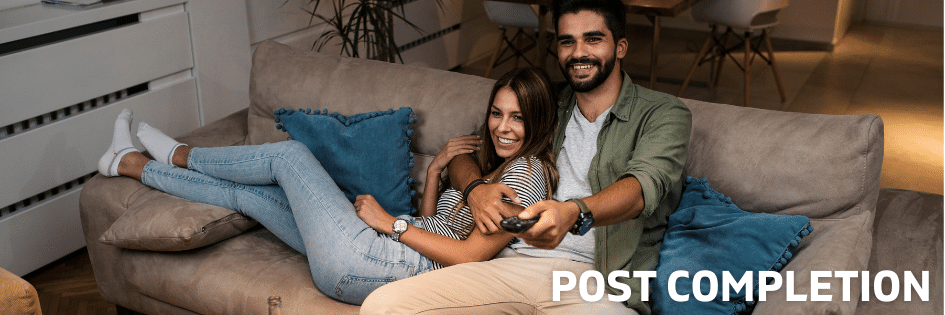
Whilst you are enjoying your new home, there is still quite a bit of work for us to do behind the scenes. Although you are now legally the owner of the property, we still need to register your ownership with the Land Registry, along with any mortgage you have taken out. We also must to pay (on your behalf) any stamp duty which is due on the purchase.
The Land Registry do take some time to deal with registrations, sometimes as long as a year! So all you need to do is sit back and relax and rest assured that we will (eventually) send to you documentation to confirm you are the new registered owners of the property, just as soon as we receive it.





